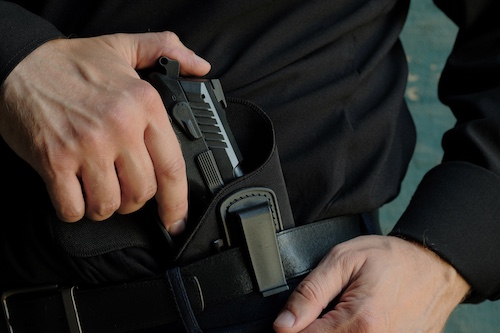At Byron Pugh Legal, we are committed to providing experienced and compassionate criminal defense representation throughout Middle Tennessee. Our practice areas include gun crimes, property crimes, and violent offenses. Whether you’re dealing with gun-related charges or other criminal allegations, we develop strategic defenses tailored to each case. If you need a dedicated advocate to fight for your rights, our team is here to help.
Facing charges for illegal firearm possession can be overwhelming, but understanding your rights and legal options is crucial. Firearm laws vary by state, and certain circumstances—such as prior convictions, restraining orders, or possession in restricted areas—can lead to serious felony charges. However, not all firearm possession is unlawful, and there are several legal defenses that may apply to your case. Whether you were unaware of the firearm, had legal authorization to carry it, or were in a permitted location, a strong defense can make a significant difference.
In this blog, we’ll explore Tennessee’s gun laws, potential penalties, and defense strategies, and discuss how working with an experienced Nashville gun crimes attorney can help protect your rights.
Understanding Tennessee Gun Laws
In Tennessee, illegal firearm possession is defined under Tennessee Code Annotated § 39-17-1307. This law outlines specific criteria for what constitutes unlawful possession of a firearm. Generally, individuals are prohibited from possessing firearms if they have felony convictions, have been adjudicated as mentally defective, or are subject to certain restraining orders.
It is important to distinguish between carrying different types of firearms, including handguns and other weapons. For example, the law may treat possession of a handgun differently than possession of a deadly weapon such a shotgun or rifle. Understanding these distinctions is crucial for anyone facing charges related to illegal firearm possession.
State and Federal Jurisdiction
Gun crimes can be prosecuted under both state and federal law. In Tennessee, state law governs most firearm offenses, while federal law applies to firearm homicides and broader issues such as interstate commerce and firearm trafficking.
The penalties for illegal firearm possession can vary significantly between state and federal jurisdictions. For instance, a state charge may result in a misdemeanor, while a similar federal charge could lead to felony penalties. Understanding the differences in these laws is essential for defendants, as it can impact their legal strategy and potential outcomes in court.
Importance of Compliance
Compliance with both state and federal gun laws is vital for any firearm owner in Tennessee. Ignorance of the law is not a valid defense against charges of illegal firearm possession. Individuals must remain informed about changes in legislation and how these changes may affect their rights and responsibilities regarding firearm ownership.
Penalties for Illegal Firearm Possession
Understanding the penalties for illegal firearm possession in Tennessee is crucial for anyone facing such charges. The law distinguishes between misdemeanor and felony offenses, each carrying different consequences.
Misdemeanor Charges
In Tennessee, illegal firearm possession can lead to misdemeanor charges. A first-time offense is typically classified as a Class B misdemeanor crime. This can result in:
- Up to 30 days in jail.
- A fine of up to $500.
- Probation or community service.
If a person has prior misdemeanor convictions for illegal firearm possession, the charge can escalate to a Class A misdemeanor. This may include:
- Up to 11 months and 29 days in jail.
- A fine of up to $2,500.
The increase in penalties reflects the state’s focus on reducing gun violence and ensuring public safety.
Felony Charges
Felony charges arise under specific circumstances. If an individual has a previous felony conviction, illegal firearm possession can lead to more severe penalties. The following factors can lead to felony charges:
- Possessing a firearm after being convicted of a violent crime.
- Having a felony conviction related to drug offenses.
- Being a fugitive from justice.
Individuals facing felony charges can expect:
- A Class E felony for unlawful possession, which carries a sentence of 1 to 6 years in prison.
- Heavier penalties for repeat offenders or those with more serious convictions.
The impact of prior felony convictions can significantly increase the length of the sentence and limit opportunities for parole. Understanding these penalties is essential for anyone involved in a firearm possession case in Tennessee.
Circumstances Leading to Felony Charges
Understanding the circumstances that lead to felony charges for illegal firearm possession in Tennessee is essential for individuals seeking to navigate the state’s firearm laws.
Felony Convictions
In Tennessee, individuals with prior felony convictions face enhanced penalties for illegal firearm possession. A conviction for a violent crime, such as aggravated assault or robbery, can lead to stricter consequences. If you have a felony conviction related firearm violence or to drug offenses, the law views you as a higher risk for firearm possession. This means that if you are caught with a firearm, you may face felony charges, which carry severe penalties, including lengthy prison sentences.
Specific Offenses
Certain scenarios can elevate the charge of illegal firearm possession to a Class E felony. For example, if you possess a firearm while committing a violent crime, the law treats this crime punishable more seriously. Additionally, if you have been adjudicated as a “mental defective” or have a restraining order against you due to domestic violence, possessing any firearm can result in felony charges. Understanding these specific offenses is crucial for anyone facing allegations of illegal firearm possession in Tennessee.
Defenses to Unlawful Possession
When facing charges of unlawful firearm possession in Tennessee, it is important to explore potential legal defenses that may justify or exempt your possession under the law.
Lawful Possession Exceptions
In Tennessee, there are specific situations where individuals may legally possess firearms despite facing charges for illegal firearm possession. Understanding these exceptions can be crucial for your defense. For instance, if you can prove that you were in a location where firearm possession is permitted, such as a gun range or a hunting area, this could serve as a valid defense. Additionally, if you were unaware that you were in possession of a firearm, or if it was not yours, these factors may also support your case.
Authorized Possession
Certain individuals may hold valid permits that exempt them from illegal weapon possession charges. For example, those with a valid handgun carry permit are generally allowed to carry firearms in most public places. Furthermore, individuals engaged in lawful activities, such as law enforcement officers or military personnel, may possess firearms without facing legal consequences. Demonstrating that you fall into one of these categories can significantly strengthen your defense against unlawful possession charges.
Common Gun-Related Offenses
Understanding common gun-related offenses is crucial for anyone navigating Tennessee’s firearm laws. These offenses can lead to severe legal consequences, including fines and imprisonment. Below are some of the most prevalent offenses related to illegal firearm possession in Tennessee.
Unlawful Possession
Unlawful possession occurs when individuals prohibited from owning firearms are found in possession of one. This includes:
- Individuals with felony convictions: Those convicted of violent crimes or certain drug offenses cannot legally possess firearms.
- Individuals adjudicated as mentally defective: This includes those who have been involuntarily committed to a mental institution.
- Individuals subject to a protective order: Those facing domestic violence orders may also face charges for unlawful possession.
The penalties for unlawful possession can vary, but they often lead to significant legal repercussions, including felony charges.
Carrying Without a Permit
Tennessee has enacted a permitless carry law, allowing individuals to carry firearms without a permit under specific conditions. However, even with this law, there are limits:
- Carrying in prohibited places: Individuals cannot carry firearms in certain locations, such as schools, government buildings, or private property where firearms are banned.
- Carrying while intoxicated: Possessing a firearm while under the influence of drugs or alcohol can result in serious legal consequences.
Violating these regulations can lead to misdemeanor or felony charges, depending on the circumstances.
Possession During the Commission of a Crime
Possession of a firearm during the commission of a crime can escalate the severity of charges. This includes:
- Using a firearm during a robbery or assault: If a firearm is used in conjunction with another crime, it can lead to additional felony charges.
- Possessing a firearm while committing drug offenses: This can result in harsher penalties, as the combination of drug and firearm offenses is taken seriously by law enforcement.
The presence of a firearm during the commission of a crime can significantly increase the potential penalties, making it essential to understand the implications of firearm possession in these scenarios.
Defense Strategies
Defending against illegal firearm possession charges in Tennessee requires a solid strategy. Understanding the available defenses can significantly impact the outcome of your case. Here are some key defense strategies to consider:
Challenging Search and Seizure
The Fourth Amendment protects against unreasonable searches and seizures. If law enforcement officials conducted an illegal search, any evidence obtained may be inadmissible in court. This can weaken the prosecution’s case.
- Unlawful Search: If the police did not have probable cause or a warrant, you can challenge the legality of the search.
- Suppression of Evidence: Successfully contesting the search can lead to the suppression of evidence, which may result in case dismissal.
Proving Lawful Possession or Use
Demonstrating that you possessed the firearm legally is a strong defense.
- Valid Permits: If you have a valid firearm permit, this can protect you from charges of illegal possession.
- Ownership and Intent: Showing that you owned the firearm and had no intent to commit a crime can also support your defense.
Arguing Self-Defense
In certain situations, claiming self-defense can be a valid argument against illegal firearm possession charges.
- Reasonable Fear: If you can prove that you had a reasonable fear of imminent harm, this may justify your possession of the firearm.
- Use of Force: If the firearm was used in a manner consistent with self-defense laws, this can strengthen your case.
Contact an Experienced Nashville Gun Crimes Lawyer Today!
If you’re facing firearm-related charges in Tennessee, it’s crucial to have skilled legal representation on your side. Our team at Byron Pugh Legal has the experience and knowledge to defend your rights and navigate the complexities of gun laws.
Contact us at 615-255-9595 for a free case review today!






